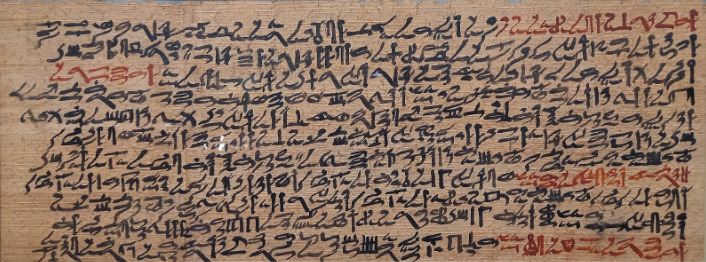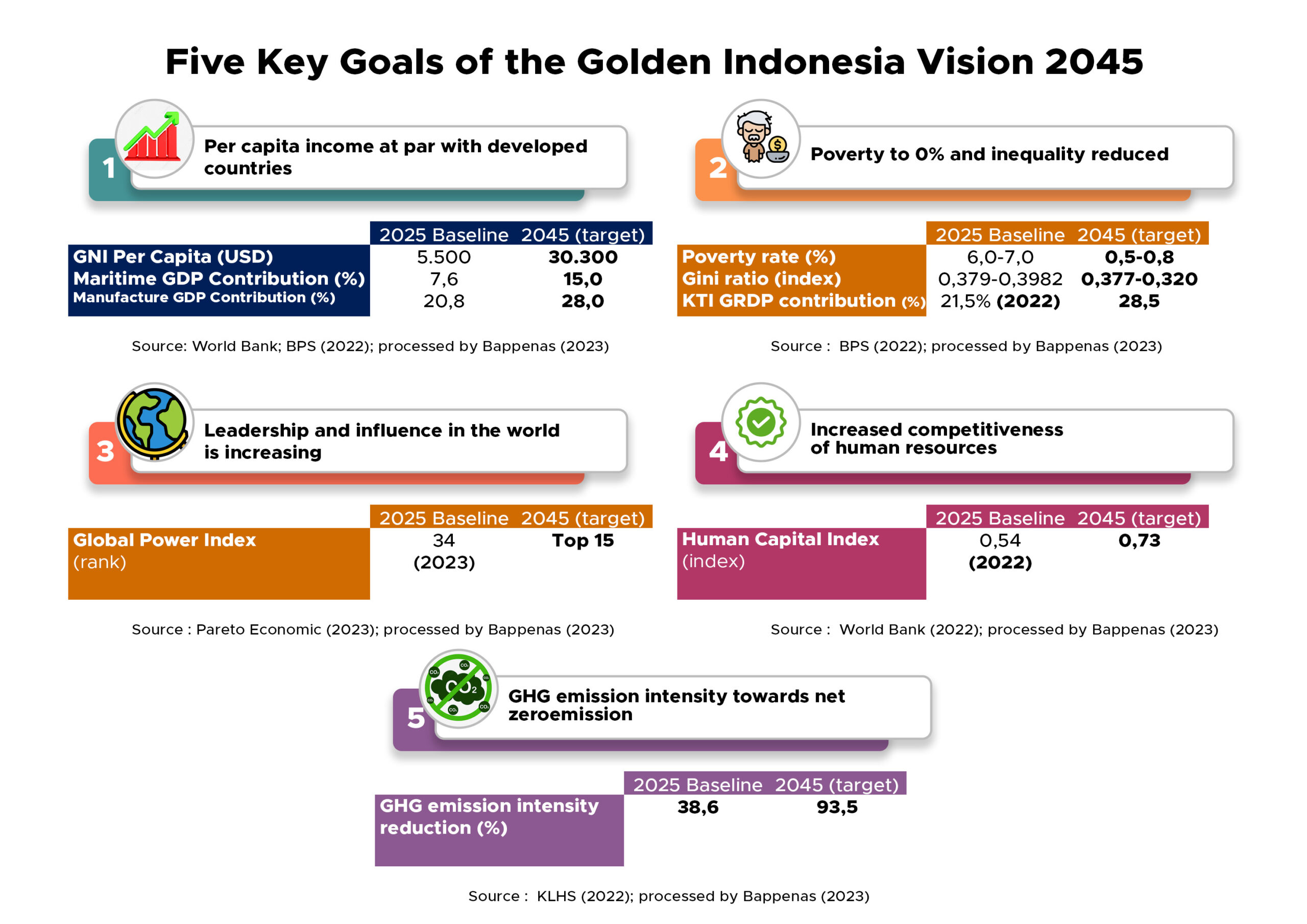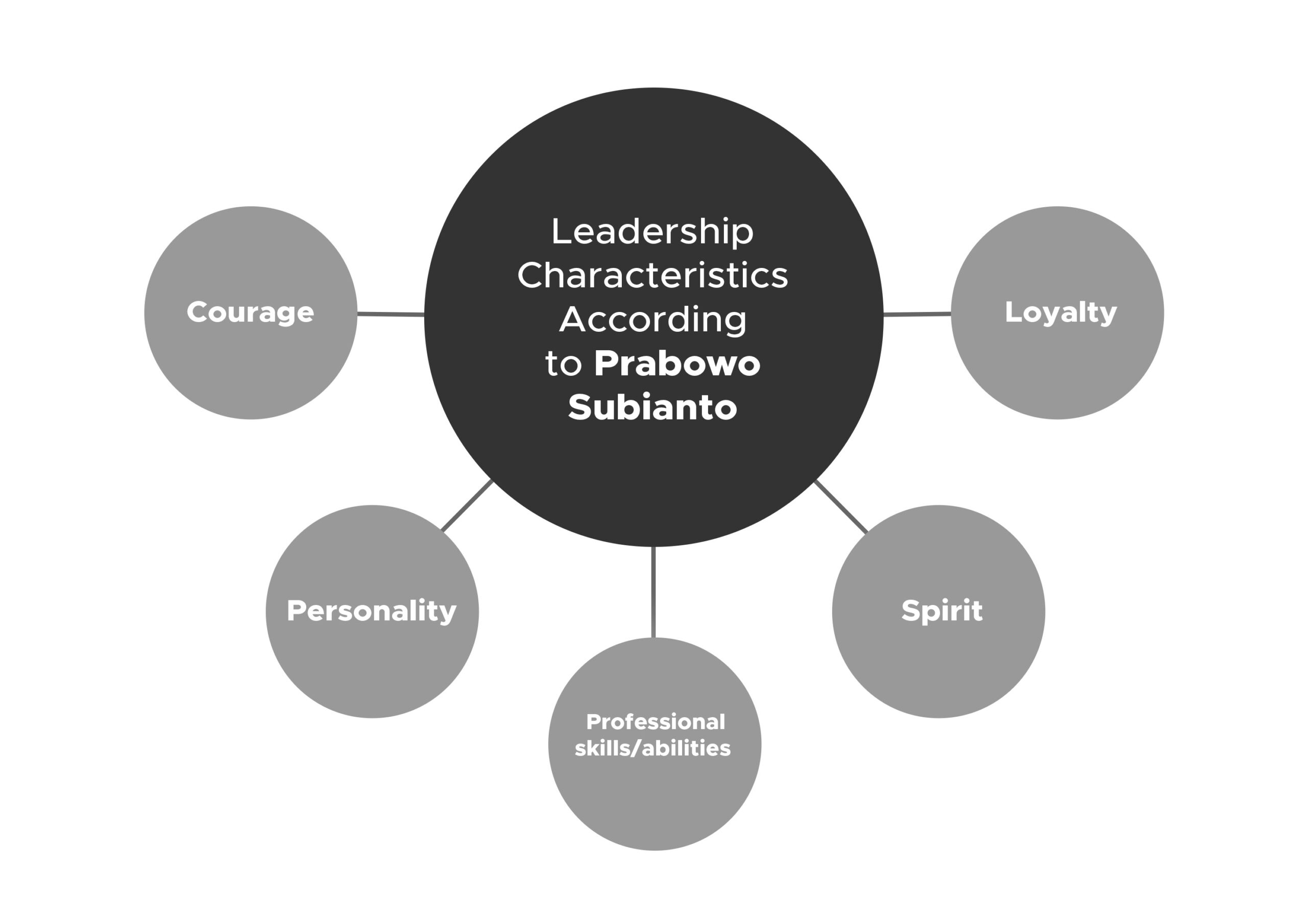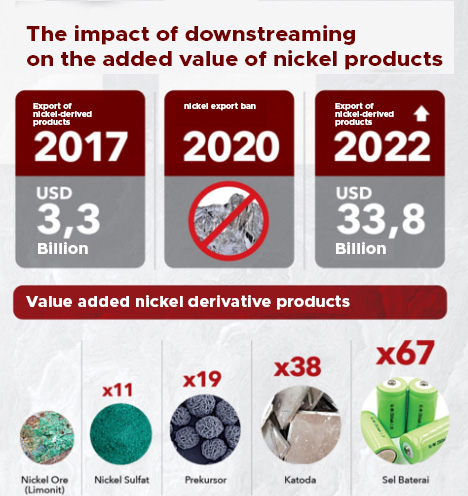
Abstract
Strategic leadership and statecraft are key elements in achieving the Vision of Indonesia Emas 2045. Through historical analysis and leadership theory, this paper demonstrates that the success or failure of a nation heavily depends on the quality of its leadership. This article explores the concept of effective strategic leadership based on various expert theories and the importance of combining Western and Eastern leadership values in the Indonesian context. Practical recommendations include the development of sustainable youth leadership training programs, the significance of integrity and commitment to the nation, and an anti-corruption culture. Successful policy implementations, such as downstreaming, highlight the importance of strategic leadership and statecraft in bringing significant benefits to the country. This paper emphasizes that the next generation of national leaders must implement skillful, integrity-driven, and corruption-free strategic leadership to realize the Vision of Indonesia Emas 2045.
Keywords: Strategic leadership, statecraft, Vision of Indonesia Emas 2045, integrity, leadership training, downstreaming, anti-corruption
Introduction
“If you are to be a leader, guiding the actions of many, strive to be a good and kind leader, and endeavor to perfect your conduct,” wrote Ptahhotep, a vizier under King Isesi of Egypt’s Fifth Dynasty (Gutenberg, n.d.). Ptahhotep’s instructions, as this writing is now known, are considered by many historians to be the oldest book in the world containing teachings on leadership.

Source: BnF Archives et Manuscripts, n.d.
This over 4000-year-old book was written by Ptahhotep for his son, who was being groomed to become a future leader of Egypt. Ptahhotep’s instructions underscore the importance of leadership knowledge for the sustainability of a civilization—even thousands of years ago.
Renowned historian Arnold Toynbee, who studied the rise and fall of 26 world civilizations, posited that history can be summarized by a simple formula: challenge and response. In his book A Study of History, Toynbee explains that challenges arise from the dynamics of world events (i.e., crises, pandemics, wars, etc.) and how leaders and the led respond to them (Toynbee, 1934). For Toynbee, the advancement and decline of civilizations are inseparable from the factor of leadership.
Similarly, historians Will and Ariel Durant echo this sentiment. Like Toynbee, they studied numerous civilizations, past and present. In The Lessons of History, Will and Ariel Durant state that while great civilizations can be destroyed by external factors, such destruction is usually preceded by “leadership failures,” particularly in addressing internal conflicts (Durant & Durant, 1968).
Thus, it is not surprising that every civilization in the world—classical or modern, Eastern or Western—places great emphasis on leadership due to its impact on survival. Differences in the type and/or focus on the ideal form of leadership (e.g., moral, religious, ideological, etc.) may occur from one civilization to another, from one country to another. However, intellectuals across time and space generally acknowledge that leadership can make or break a nation.
In his book Paradoks Indonesia dan Solusinya, Prabowo Subianto underscores that one of Indonesia’s current issues is “leadership problems, wisdom problems, the willingness to make the right political decisions” (Subianto, 2022). In Strategi Transformasi Bangsa, Prabowo Subianto explains that Indonesia loses nearly 2,800 trillion rupiahs annually due to corruption and budget leaks. (Subianto, 2023).
This leadership issue becomes relevant and important as Indonesia strives to realize the Vision of Indonesia Emas 2045. Simply put, by the 100th anniversary of its independence, Indonesia aims to become one of the five largest economies in the world (National Development Planning Agency/Bappenas, 2019). Additionally, Indonesia aims to transform into a high-income country and escape the middle-income trap.
To achieve the Vision of Indonesia 2045, there are five major goals to be reached by or before 2045: first, per capita income equivalent to developed countries; second, poverty towards 0% and reduced inequality; third, increased leadership and influence in international affairs; fourth, enhanced competitiveness of human resources; and fifth, reduced greenhouse gas (GHG) intensity towards net zero emissions (National Development Planning Agency/Bappenas, 2024).

Source: National Development Planning Agency/Bappenas, 2024.
Thus, national strategic leadership becomes crucial as it will determine whether Indonesia succeeds or fails in transforming into a developed and prosperous country. Failure to achieve the five main goals mentioned above will leave Indonesia adrift in mediocrity and lose the golden opportunity to become a high-income country, especially considering the demographic bonus, as President Joko Widodo (Jokowi) explained, which will end in the next 12-13 years (Achmad, 2023).
Leadership and Strategic Leadership
In the article “Understanding Leadership” from the Harvard Business Review, leadership is defined as the ability to achieve goals through guidance and cooperation with other people (Prentice, 2004). The essence of leadership here is not merely about power but about the ability to understand and collaborate with others. The result is a conducive and productive work environment because the goals of all team members align with the organization’s goals.
According to Michael E. Porter in the article “What Is Strategy?” from the Harvard Business Review, strategy is the creation of a unique and valuable position by choosing a different set of activities from competitors. Strategy involves making trade-offs and ensuring a fit between activities to achieve sustainable competitive advantage (Porter, 1996).
Strategic leadership, then, is defined as the ability to influence others in making decisions that enhance the long-term prospects of the organization while maintaining flexibility in facing environmental changes. According to Adair (2010), strategic leadership includes key functions such as providing direction for the organization, thinking and planning strategically, and developing future leaders. Strategic leadership is not only about vision and direction but also about ensuring that the vision is realized through concrete actions and remains adaptive to environmental changes.
In this context, strategic leadership involves the ability to connect various parts of the organization into a cohesive whole. This includes building partnerships, developing organizational culture, and cultivating current and future leaders. Strategic leadership can also be defined as the art and science of directing people and resources to achieve long-term goals while remaining responsive to external environmental dynamics (Adair, 2010).
Characteristics and Skills of Strategic Leaders
The characteristics and skills that a strategic leader must possess encompass various aspects, including cognitive, affective, and managerial. According to Schoemaker, Krupp, and Howland (2013), there are six main skills needed for strategic leadership. First is anticipation, the ability to detect threats and opportunities. Strategic leaders must always be alert and continually hone their ability to anticipate changes by scanning the environment for signs of change.
The second skill is challenge, the ability to question the status quo and encourage diverse viewpoints. Strategic leaders must dare to challenge their own and others’ assumptions and encourage deep reflection before taking action. The third is interpretation, the ability to synthesize complex and conflicting information. Strategic leaders must recognize patterns, understand ambiguities, and seek new insights.
The fourth skill is decision-making, the ability to make difficult decisions with incomplete information, often requiring swift action. Strategic leaders must follow a disciplined process that balances rigor with speed and considers both short-term and long-term goals. The fifth is alignment, the ability to find common ground and achieve agreement among stakeholders with different views and agendas. Strategic leaders must proactively communicate, build trust, and frequently engage with stakeholders.
The sixth skill is learning, the ability to promote a culture of learning and to find lessons from both achievements and failures. Strategic leaders must foster a culture where mistakes are seen as learning opportunities and avenues for improvement.
Prof. Dr. Jimly Asshiddiqie (2024) adds that strategic leadership does not only focus on cognitive knowledge and managerial skills but also on the character and integrity of the leader. According to him, effective leadership must be nurtured through practical experience and exemplary figures. This is crucial to ensure that leaders can fulfill their responsibilities with a sense of accountability and concern for the common good (Jimly, 2024).
Furthermore, discussing strategic leadership is incomplete without addressing military leadership. Leadership studies have long found their “home” in the military, which requires order, discipline, and the art of managing people. Even the word strategy itself comes from the Greek word “stratēgia,” meaning the command of a general (strategy | Search Online Etymology Dictionary, n.d.).
In his book Military Leadership Volume 1, Prabowo Subianto outlines five characteristics that a leader must possess (Subianto, 2023). These five characteristics are:
- Professional Competence: A leader must thoroughly master their field of work. Additionally, a leader must have the skills to solve current problems and possess a forward-looking vision.
- Personality: A leader must exhibit good behavior, morals, and personality. Ideally, a leader embodies the philosophy of hasta brata.
- Loyalty: A leader must demonstrate clear and tangible loyalty to their subordinates, the nation, and the country.
- Courage: A leader must be brave enough to take steps that benefit the institution and its larger goals, even if those steps involve risks and/or resistance. Courage also encompasses the resolute determination to execute a strategic policy. It is indisputable that any policy and/or strategic transformation requires the courage to implement it.
- Spirit: A leader must be persistent and determined in executing strategic policies. A spirited leader will have the strength to complete the mission and exceed expectations.

Source: Subianto, 2023.
Example of Effective Strategic Leadership: Downstreaming
Indonesia possesses extraordinary natural wealth. In his book Strategi Transformasi Bangsa, Prabowo Subianto explains that Indonesia ranks 11th among countries with the largest natural resources, valued at 1.5 trillion USD. For instance, Indonesia has the world’s largest nickel reserves, the second-largest tin reserves, and the sixth-largest bauxite reserves (Subianto, 2023).
Historically, Indonesia has focused on exporting raw materials, thereby losing significant added value. Consequently, President Joko Widodo (Jokowi) implemented a strategic policy known as downstreaming. The President also banned the export of raw materials, such as nickel, abroad. This ban was followed by prohibitions on the export of bauxite, copper, and tin. These materials are essential for the production of steel, batteries, electric cars, and various electronics worldwide. This strategic policy faced opposition from the WTO and Europe, which expected Indonesia to continue selling raw materials. However, President Jokowi took a bold stance to proceed with downstreaming, believing it would yield greater benefits for the nation and country.

Source: Nation Transformation Strategy (Subianto, 2023)
The results of downstreaming are clearly visible. For instance, before nickel downstreaming, the export value was 3.3 billion USD per year. After downstreaming, this value skyrocketed tenfold to 33.8 billion USD. The deeper and further Indonesia pursues downstreaming of raw material commodities, the greater the added value created and the higher the potential national income.
In summary, downstreaming has proven to increase economic added value, create jobs, and drive regional economic growth. Therefore, the downstreaming policy can be considered a successful example of strategic policy and leadership demonstrated by President Jokowi. Upon closer examination, President Jokowi’s strategic downstreaming decision aligns with leadership characteristics such as loyalty (to the nation and country), professional competence (forward-looking vision), and courage (facing resistance).
Example of Ineffective Leadership: The Fall of Enron
At its peak in 2000, the American energy company Enron was ranked among the top 100 companies in the world by Fortune magazine. However, behind the scenes, Enron’s leadership, particularly Jeffrey Skilling, exhibited poor, even criminal, leadership (Yukl, 2013). This poor leadership was nurtured and even promoted, eventually infecting his subordinates.
From a personality perspective, Skilling and some of his subordinates engaged in deceptive financial reporting that clearly violated ethics and laws to give the impression that Enron was profitable. From a professional competence perspective, Skilling and some of his subordinates focused solely on short-term profits, neglecting long-term sustainability by normalizing many illegal practices. Skilling also did not enforce a merit system in promotions. Those promoted were individuals who would stop at nothing to gain profit, rather than those who were truly competent.
From a loyalty perspective, Skilling had no loyalty to his subordinates and customers. He deliberately created blackouts for customers in California to increase energy prices and sell to the highest bidder. Skilling also frequently laid off subordinates who refused to engage in unethical and/or illegal practices.
Due to strategic leadership failure, Enron went bankrupt in 2001. Enron investors and shareholders lost billions of dollars. Enron’s 20,000 employees lost their jobs due to the leadership’s misconduct. Arthur Andersen, the prominent accounting firm hired by Enron, was found guilty of financial fraud, leading to its dissolution. Skilling and his involved subordinates were imprisoned. Therefore, the failure of Enron’s leadership is a common case study in nearly all strategic leadership textbooks (Yukl, 2013).
The Importance of Leadership in Strategic Environmental Dynamics
President Susilo Bambang Yudhoyono (SBY) emphasized the importance of strategic leadership in the context of national development. In his presentation at the Defense University, SBY highlighted that strategic leaders must understand the vision, mission, and context of the evolving strategic environment. According to SBY, a strategic leader must not only comprehend the organization’s vision and mission but also be able to analyze and interpret external environmental changes to anticipate emerging challenges. Strategic leaders must have strong critical and analytical thinking skills to make long-term impactful decisions and effectively implement strategic policies and plans (SBY, 2024).
Moreover, SBY highlighted the importance of strategic leaders’ ability to overcome crises and shocks while upholding justice and leading national development. Leaders must have the courage to make difficult and unpopular decisions for the long-term good of the nation. SBY stated that a strategic leader must be able to build consensus and collaboration among various stakeholders to achieve common goals. Effective strategic leadership, according to SBY, also involves developing human resources and improving the quality of education to create a competent and integrity-driven future generation of leaders (SBY, 2024).
In the context of facing dynamic strategic environments, Prof. Dr. Jimly Asshiddiqie emphasizes that leaders must be able to quickly adapt to changes. Strategic leaders must have a clear vision for the organization’s future and be able to inspire others to work towards that vision. Additionally, Jimly underscores the importance of inclusive leadership, where leaders listen to and consider various perspectives to make better and more holistic decisions (Jimly, 2024).
Thus, the strategic leadership outlined by SBY and Jimly encompasses various essential aspects such as vision, analytical capability, courage, integrity, and adaptability. This demonstrates that strategic leadership is a key element in ensuring the success of organizations and nations in facing challenges and capitalizing on opportunities in a dynamic environment.
The Right Leadership for Indonesia Moving Forward
In Military Leadership Volume 2, Prabowo Subianto states that “the right leadership for Indonesia” is a combination of good leadership streams from the West and East, as well as good leadership teachings from Indonesia (Subianto, 2023). From this combination of good elements, it is hoped that a “leadership style suitable for Indonesia” will emerge. Furthermore, this leadership is demonstrated through “service and not seeking personal gain.”
In his presentation at the Ministry of Defense, Prabowo Subianto said the true essence of “leadership is love and loyalty to the nation and country.” Thus, the ultimate goal of strategic leadership for Indonesia—currently—is to realize the Vision of Indonesia Emas 2045.
Besides strategic leadership, Prabowo Subianto emphasizes the importance of statecraft or skilled state management. Statecraft includes the ability to formulate effective public policies, manage international relations, and ensure national stability and security. Similarly, political and management experts Weinberg and Bower state that a good and healthy organization is one that possesses the component of statecraft leadership (Bower and Weinberg, 1988). Here, statecraft refers to the skills involving the use of persuasion and informal authority to move coalitions to achieve goals.
Thus, a leader who masters statecraft can integrate economic, social, and political policies to create a conducive environment for sustainable development. They must also possess high diplomatic skills to build beneficial international alliances, as well as firmness in maintaining national sovereignty. In other words, statecraft is the art of managing a country that focuses not only on achieving short-term goals but also on long-term strategies that advance national interests.
Conclusion
Strategic leadership and statecraft are key elements in achieving the Vision of Indonesia Emas 2045. Through historical analysis and leadership theory from various perspectives, it is evident that the success or failure of a nation heavily depends on the quality of its leadership. Effective strategic leadership, as outlined by experts such as Michael E. Porter and John Adair, involves the ability to formulate a long-term vision, develop appropriate strategies, and manage environmental changes adaptively.
In the context of Indonesia, the ideal leadership is a combination of the best values from Western and Eastern leadership, integrated with Indonesian leadership teachings. Practical recommendations arising from this analysis include the development of sustainable leadership training programs focusing on strengthening strategic and statecraft skills. In-depth education and training on diplomacy, political economy management, crisis management, and domestic policy should be targeted at students and young leaders under the age of 30. This ensures they are early exposed to and thinking about statecraft and the nation’s future. This aligns with Prabowo Subianto’s idea that brilliant leaders will focus on empowering human resources.
Additionally, it is important to foster leaders with high integrity and a strong commitment to the nation, emphasizing values of service rather than personal gain—as highlighted by Prabowo Subianto. This integrity includes rigorously and consistently combating corruption, ensuring that every policy and decision is made in the best interest of the nation, not for personal or specific group benefit.
The implementation of policies such as downstreaming, successfully executed by President Jokowi, demonstrates how effective strategic leadership and statecraft can bring significant benefits to the country. Conversely, Enron’s failure underscores the importance of integrity and honesty in leadership. Future national leaders must continue to implement skillful, integrity-driven, and corruption-free strategic leadership and statecraft. Only in this way can Indonesia realize the Vision of Indonesia Emas 2045.
*This writing is taken and translated from Strategi Kepemimpinan Efektif: Mewujudkan Visi Indonesia Emas 2045.
References
Adair, J. (2010). Strategic leadership: How to think and plan strategically and provide direction. Kogan Page.
Bower, Joseph Lyon dan Martha Wagner Weinberg. (1988, Januari). Statecraft, Strategy, and Corporate Leadership. California Management Review, 30(2), 39-56.
BnF Archives et Manuscrits. (n.d.). Egyptien 187. Enseignement de Ptahhotep (75-123) [Gambar]. Dikutip dari https://archivesetmanuscrits.bnf.fr/ark:/12148/cc12921q/ca104
Durant, W., & Durant, A. (1968). The lessons of history. Simon & Schuster.
Etymology Online. (t.t.). Strategy. Dikutip dari https://www.etymonline.com/search?q=strategy
Gutenberg. (n.d.). The instructions of Ptah-Hotep and the instruction of Ke’Gemni: The oldest books in the world. Dikutip dari https://www.gutenberg.org/files/30508/30508-h/30508-h.htm#chap02
Jimly, A. (2024). Pemimpin dan kepemimpinan di era globalisasi. Pustaka Nasional.
Kementerian Perencanaan Pembangunan Nasional/Bappenas. (2019). Visi Indonesia 2045: Berdaulat, maju, adil, dan makmur. Dikutip dari https://perpustakaan.bappenas.go.id/e-library/file_upload/koleksi/migrasi-data-publikasi/file/Policy_Paper/Ringkasan%20Eksekutif%20Visi%20Indonesia%202045_Final.pdf
Kementerian Perencanaan Pembangunan Nasional/Bappenas. (2024). Rancangan akhir RPJN 2025-2045. Dikutip dari https://drive.google.com/file/d/1JSZp1Oz37KWktxi-hi0okVXxEsKuaU-I/view
Achmad, Nirmala Maulana. (2023, Mei 15). 13 tahun lagi bisa jadi negara maju, Jokowi ingatkan masyarakat tak salah pilih. Kontan.co.id. Dikutip dari https://nasional.kontan.co.id/news/13-tahun-lagi-bisa-jadi-negara-maju-jokowi-ingatkan-masyarakat-tak-salah-pilih
Ningtyas, Eka. (2019, April 4). [Fakta atau Hoaks] Benarkah KPK Menyebutkan Pendapatan Negara Bocor Rp 2000 T?. Tempo. Dikutip dari https://cekfakta.tempo.co/fakta/199/fakta-atau-hoaks-benarkah-kpk-menyebutkan-pendapatan-negara-bocor-rp-2000-t
Persada, Syailendra. (2019, April 8). KPK: Kami Tak Pernah Sebut Anggaran Bocor Rp 2.000 Triliun, Tapi. Tempo. Dikutip dari https://nasional.tempo.co/read/1193630/kpk-kami-tak-pernah-sebut-anggaran-bocor-rp-2-000-triliun-tapi
Porter, M. E. (1996, November–December). What is strategy?. Harvard Business Review. Dikutip dari https://hbr.org/1996/11/what-is-strategy
Prentice, W. C. H. (2004, Januari). Understanding leadership. Harvard Business Review. Dikutip dari https://hbr.org/2004/01/understanding-leadership
Schoemaker, P. J. H., Krupp, S., & Howland, S. (2013). Strategic leadership: The essential skills. Harvard Business Review.
Subianto, P. (2022). Paradoks Indonesia dan solusinya. Jakarta: PT. Media Pandu Bangsa.
Subianto, P. (2023). Kepemimpinan militer: Catatan dari pengalaman Jilid 1. Jakarta: PT. Media Pandu Bangsa.
Subianto, P. (2023). Kepemimpinan militer: Catatan dari pengalaman Jilid 2. Jakarta: PT. Media Pandu Bangsa.
Subianto, P. (2023). Strategi Transformasi Bangsa: Menuju Indonesia Emas 2045. Jakarta: PT. Media Pandu Bangsa.
Toynbee, A. (1934). A study of history. Oxford University Press.
Yudhoyono, Susilo Bambang. (2024). Paparan kuliah umum. Universitas Pertahanan.
Yukl, G. (2013). Leadership in organizations. Pearson.




